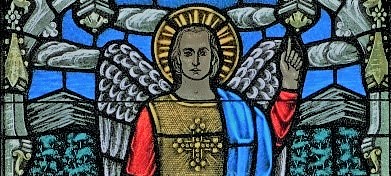“Ephphatha”, from the Gospel,is a Greek form of a Syro-Chaldaic or Aramaic word, meaning “Be opened“. This word was uttered by Christ when healing the man, who was deaf and dumb, a man frustrated by his limitations. Speaking to the Corinthians’ community (today’s Epistle), St Paul states, “We are not sufficient of ourselves to think anything as of ourselves; but our sufficiency is of God…” What do all these people (deaf/dumb & Corinthians) have in common?
They all struggle, want life to be better and they’re convinced—or want to be convinced—that a certain practice will make it so. These people aren’t unusual; they represent nearly all of us in one way or another. Some of our practices are superstitious, others mental, some mostly or partially rooted in scripture, some thoroughly godly, and others thoroughly pagan. We have rituals, habits, tricks, routines, formulas, and all sorts of other means to influence a situation. That’s because we feel out of control, and we’re desperate to have some semblance of mastery over our circumstances.
Mostly we’re just trying to get by in a frustrating world. Human beings are full of questions: What does my future hold? Who will protect me and provide for me? How can I find the truth? Does truth even exist? How can I be fulfilled? When we feel confused, we search for answers. And when we feel beaten down—by adverse circumstances, by the forces of fate, or simply by the unpredictable movements of everyday life—we appeal to whatever sources of help we can find.
History is littered with such appeals, from the mundane to the mystical. Trapped in the confines of a material world, we seek access to whatever’s behind it. Something in us craves an alternative to our very inadequate resources. We’re frustrated by our limitations, and we hunger for supernatural help. The people around the deaf and dumb man and the people in Corinth were also seekers of the supernatural. They had an array of incantations, spells, amulets, and other techniques for harnessing divine power.
Paul used some of their terminology in his letters, but for a different purpose. He attributed all power and authority to the One who was raised from the dead and exalted in heaven. God’s people—those who humbly depend on him in faith—have access to a greater power than the world has ever known. One of the strongest messages of this Sunday is that we don’t have to live in frustration and futility anymore. Though we have long lived in a murky, confused, rebellious environment—a world separated from its Creator by its own counterfeit pursuits—our connection with our Father has been restored through the grace and the exaltation of His Son.
If you’ve ever felt like someone groping in darkness for any hint of light; if you’ve ever felt powerless to face the assault on your life by the world around you; if you’ve ever longed for a deeper connection with your heart’s true home; then let the powerful word of Jesus, “Ephphatha”, really sink in. Its truths take us out of our own limitations; seat us at the right hand of the ultimate Father. We don’t need tricks or techniques to get by. Our call for help has forever been answered.



